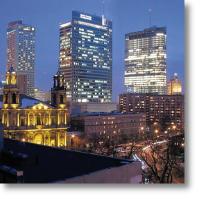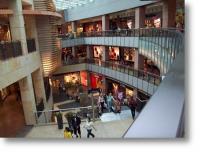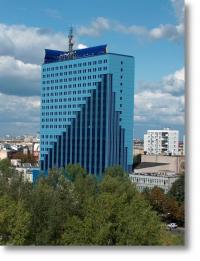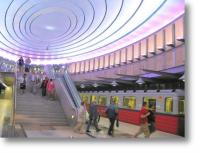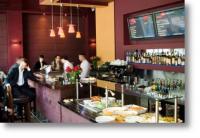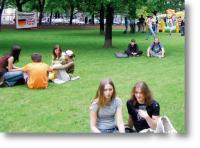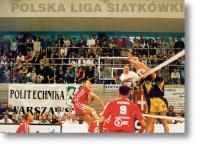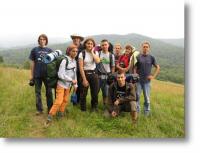Students Life
Article index
Living in Warsaw
Poland is well known for its Slavic hospitality. The visitors should have no problems making friends as Poles are almost always interested in meeting foreigners. Poles have a highly developed sense of humor; they love jokes and have at least one for every occasion. Humor and laughter in the face of hardship are a big part of being Polish.
Communication in Poland is not a serious problem. Warsaw is a university town and the level of foreign language education is quite high, especially among young people. English is by far most frequently used; German, French, and Russian are also popular.
The złoty is the official Polish currency. If you would like to exchange your money or cash traveler's checks, it can be done in one of many Warsaw banks. If all you need is a simple cash exchange, it might be easier to do it in a „kantor" (kantors are private money exchange offices; you can find them at railway stations, in hotels, shops, restaurants, movie theaters and many other places). Major credit cards are accepted in hotels, travel agencies, and many shops and restaurants.
Shopping in Warsaw can be fascinating. Today, you will find shops well stocked with a variety of high-quality Polish and Western goods; just about every imaginable product is available within easy walking distance of the University. The free-market economy is alive and the shopping scenę in Warsaw, full of department stores, fashion retailers, secondhand book-shops, and street markets, is very well developed and still is changing almost every day.
When it comes to clothing, you have to realize that weather in central Poland varies a lot. Warm clothing and good shoes arę needed for winter which can be cold, with snow and temperatures below -10°C. Summer, on the other hand, is warm, but rarely very hot, with average maximum daily temperatures around 22°C.
Accommodation
Most students of the Faculty of Electronics and Information Technology live in the 15-story Riviera located within a 5-minute walk of the Faculty building. The residents are accommodated in shared fully-furnished rooms. Bathroom facilities, kitchens, laundries, study areas and meeting rooms are located on each floor. Computer laboratories, music practice rooms, photographic darkrooms, sports and recreation facilities, shops, and dining rooms are also available. Other dormitories with single and shared rooms are located within a few kilometers of the main campus, but are well served by public transportation; travel times vary from 5 to 20 minutes.
Room charges are in the range of 100 euros per month and are payable each month in advance. Although the dormitories do not provide high-standard accommodation, the cost of the University housing is below market rates. Therefore, the demand for rooms is higher than the supply and not all international students are guaranteed University accommodation, especially if they are not able to meet all conditions of entry (academic and financial). Rooms in the dormitories will be assigned on a first-come first-serve basis within the available limits.
If you would like to apply for accommodation in a University dormitory, should do so as early as possible.
Living a few kilometers away from the University presents no problem because of the excellent public transportation system in Warsaw. There is underground train connecting southern and northern districts with the center of Warsaw and the train stop is closed to the University (its name is Politechnika Warszawska, which is a Polish name of Warsaw University of Technology). There are as well hundreds of tram and bus lines. Even more important, transportation is inexpensive (about 0.70 euro per ride or about 60 euros for a three-monthly travel card).
Dining
In the Faculty of Electronics and Information Technology building there is a cafeteria serving hot dishes, sandwiches, salads, cookies, and beverages. The Main Dining Hall, located next to the Faculty building, offers main meals composed of a soup, main dish, and dessert. Various meal plan options are offered by dining facilities at the dormitories. Prices are very moderate; for example, the Main Dining Hall serves dinners to the University students and employees for just 4 euros.
For those who prefer dining off campus, there are countless restaurants, snack bars, cafes, pubs, cafeterias, and fast food stands. Many of these offer traditional Polish dishes, but one can easily find places that serve all kinds of food from all over the world; French, Italian, Chinese, Vietnamese, Japanese, Indian, Russian, Hungarian, and Jewish restaurants are within a short walk of the University.
Social Life
Two major clubs, located at Riviera-Remont and Stodoła cultural centers, and 15 small clubs provide numerous opportunities for students to grow and develop new interests. Each club has a number of activity groups organizing various cultural events. You can enjoy cinema shows, art exhibitions, dramatic group presentations, lectures by visiting speakers, political debates, song recitals, as well as rock, jazz or classical music concerts. Student clubs frequently attract inter-nationally famous people. Many cultural events in student clubs are free of charge for all University students. When visiting one of the University cultural centers not only can you watch and listen, but also actively participate in happenings or theater productions, or simply dance to the disco music. If you are a gifted singer or dancer, the internationally recognized Song and Dance Ensemble is waiting for you.
Student clubs run their own shops and publish a variety of information materials. A radio station owned and operated by the students broadcast informational and musical programs several hours a day.
Sport and Recreation
The University Center of Physical Education and Sports, open to all University students, is run by a highly qualified staff of 40 which include former coaches of the national teams and members of the Polish Olympic team.
The Center staff organizes indoor and outdoor activities for keen athletes capable of high-level competition and for those who just enjoy a casual game of volleyball. Most sport facilities located in and around student dormitories are available to all students at no charge; coaching is also free. Currently, the most popular sports are soccer, volleyball, basketball, indoor and outdoor track, swimming, tennis, table tennis, judo, karate, and kickboxing. Chess, bridge, strategy games, and other forms of recreation also attract many students. Clearly, the sport activities are not limited to the campus area; the University has a strong tradition in skiing, sailing, windsurfing, and mountain climbing.
A very popular form of recreation among the University students is tourism. Tourist clubs frequently organize weekend hiking trips to interesting places in Poland and longer summer expeditions to destinations all over the world.
Approximately, 10000 students participate in some form of sport or recreational activities. Many of them compete in the interfaculty games. The 1400 most talented students are members of the University Sports Club. They compete in a variety of local and inter-collegiate leagues as well as in national and international events. For several years, the Club has been ranked as the best among sports clubs of all engineering-oriented universities and colleges in Poland.
Health Care
The Health Center is staffed by full-time physicians, physical therapists, ophthalmologists, gynecologists, dentists, nurses, and many other health professionals. Immunizations, laboratory tests and X-rays are provided. Patients are seen by appointment and as walkins. If more specialized care is required, physicians arrange a referr-al to an appropriate specialist.
Ali students insured in National Health Fund (NFZ) are entitled to all the services available at the University Health Center as well as to all public health service at no charge. It is possible to arrange an insurance plan enabling access to private sector of health care. Appropriate plans are offered by a number of insurance companies. Rates for such programs vary significantly depending on the range of chosen services.
Religious Life
Although the Roman Catholic Church is the dominant church in Poland, there are 48 active religious organizations in Warsaw, representing other Christian denominations, Judaism, Islam, Hinduism, Buddhism, and other faiths. Most of these organizations conduct religious services for their members.
Numerous Warsaw churches and chapels offer opportunities for worship and meditation, social service, personal counseling, and cultural and social events. On request, students are given Information regarding houses of worship or are put in touch with their spiritual leaders in the city.


